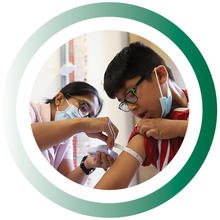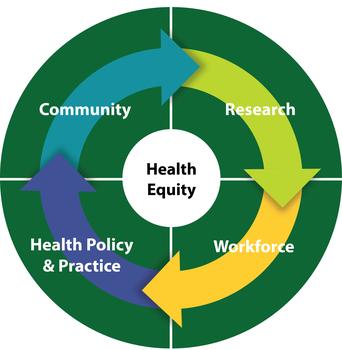The programs and services offered by George Mason University are open to all who seek them. George Mason does not discriminate on the basis of race, color, religion, ethnic national origin (including shared ancestry and/or ethnic characteristics), sex, disability, military status (including veteran status), sexual orientation, gender identity, gender expression, age, marital status, pregnancy status, genetic information, or any other characteristic protected by law. After an initial review of its policies and practices, the university affirms its commitment to meet all federal mandates as articulated in federal law, as well as recent executive orders and federal agency directives.

Collaborative for Health Equity
The College of Public Health at George Mason University is committed to promoting and delivering health equity in support of the public’s health, and to reduce lingering health disparities. We envision a Collaborative that brings together community and academic partners to promote and improve health equity by designing innovative, effective and sustainable solutions.

Mission and Vision
The Collaborative for Health Equity’s mission is to improve health equity by reducing health disparities that arise from structural inequities and barriers. We strive toward the Robert Wood Johnson Foundation’s definition of health equity to offer everyone a "fair and just opportunity to be as healthy as possible." We do this through transdisciplinary academic, research, and practice.
The Collaborative will focus on four interrelated areas:

Identifying, Evaluating, and Implementing Solutions Together
Community partnerships are an essential component of the Collaborative for Health Equity because it provides an opportunity to work together to identify, evaluate and implement solutions that aim to improve health equity. We recognize that overcoming multiple barriers to health equity will require many community partnerships to find solutions that are feasible, given the complexity of unmet health needs in different target populations.
Creating Shared Vision for Health Equity
Improving health equity requires a deep understanding of the links between local community factors that affect outcomes, the distribution of community resources, structural inequities, as well as social, economic, environmental, and political barriers. As a result, creating a shared vision with community partners that seek to improve health equity is an essential part of the Collaborative’s mission.
Transdisciplinary Impact
The Collaborative will support research of consequence and knowledge translation for diverse audiences. For example, the Collaborative would disseminate research not only to the scientific communities, but also translate these findings with stakeholders who can benefit from discoveries and community-based interventions. The Collaborative’s research arm includes multidisciplinary faculty with notable expertise in epidemiology, health policy, nursing, nutrition, social and behavioral sciences, and social work. Our expertise also includes the design and conduct of etiologic, interventional and implementation science research. Working with community partners, our faculty will seek to translate knowledge and practical insights into targeted interventions and public policies for maximum impact, while ensuring the development of a well-prepared and flexible workforce.
Diverse Research Expertise
Examples of our specific research areas include chronic diseases and related disparities, depression, environmental health and injustice, immigrant and refugee health, maternal and fetal health, substance misuse and prevention, and violence prevention. Our methodologic expertise includes study design, causal analysis of health equity, community and participatory research, and mixed methods. Our bioinformaticians are integrating a health equity lens into the artificial intelligence field. Geographically, our research focuses on populations in Virginia, the Nation and globally.
Graduating Career-Ready Workforce
Academe is responsible for ensuring the development and delivery of a well-prepared and career-ready workforce irrespective of discipline or employment sector. As such, the workforce component of the Center is integral to developing such a workforce to improve health equity. Development opportunities can also enhance the knowledge and skills of the existing workforce and aligns with the College’s longstanding delivery of continuing education for health (para)professionals.
Collaborating with Community and Employers
The Collaborative envisions working collaboratively with community partners in developing strategies and materials responsive to individual community needs and across employment sectors (e.g., community- and government-based agencies, hospitals, long-term care facilities, service and other organizations). The policy, practice and research expertise exhibited within the Center’s multidisciplinary team can be translated into educational modules disseminated to the workforce and used in onsite and virtual platforms with face-to-face or tele-behavioral health delivery modes. Community input is critical for tailoring workforce development to particular needs.
Translating Policy to Practice
Overarchingly, this component of the Collaborative will focus on the translation of findings and knowledge into clinical and public health practice and, where appropriate, health policy. As such, this component will develop issue briefs and policy statements focusing on the implementation and delivery of health equity solutions. We are strengthening our partnership with the Association of State and Territorial Health Officials (ASTHO), which is a national nonprofit organization that represents public health agencies in the United States, its Territories and the District of Columbia, to find innovative and workable solutions to support state and territorial health agencies in their pursuit of advancing health equity and optimal health for all. Future activities may include Mason faculty having an advisory role as subject matter experts in developing policy statements and guiding the development of future issue briefs. We also envision writing factsheets, infographics, or policy briefs to highlight examples of stories, activities, and findings by Center-affiliated faculty and students at Mason as well as our community partners.
Advancing Access to Health Care
The Collaborative will continue to advance access to health care, particularly for the un- or under-insured populations in Virginia and the DMV region. Approximately 648,000 Virginians are uninsured (VHCF Annual Report, 2021) and have unmet needs for such care. The College supports health care access for under-resourced populations through the provision of primary care services in our Mason and Partners Clinics throughout Northern Virginia as well as our new behavioral health and soon-to-be nutrition counseling services for students and others in the College’s Population Health Center. We also envision the Center helping to improve and facilitate access to clinical services for communities in need ranging from screening to diagnostics and therapeutics, while connecting people to social supports. Innovative access strategies can be shared with other communities through health policy initiatives where research, practice and empirically-based guidance can collectively achieve greater impact on health equity at the state or national level.
The College has an incredibly rich and diverse faculty who prepare career ready graduates for various careers in public health that is a discipline devoted to health equity. In addition, our faculty have the needed expertise in research, policy, and practice expertise who work with many community partnerships to engage our community with the Center.
Inaugural faculty members of the Center are listed below with the expectation of other faculty joining in the near future or to address specific issues.
Opportunities to support Health Equity at Mason include:
- Naming the Collaborative
- Endowing a faculty member or department chair
- Supporting student scholarships
- Funding events and symposia
Contact our Development Office today cphdev@gmu.edu.
- August 24, 2023
- April 21, 2022
- March 31, 2022
- March 23, 2022
- February 9, 2022
